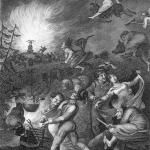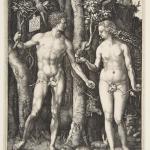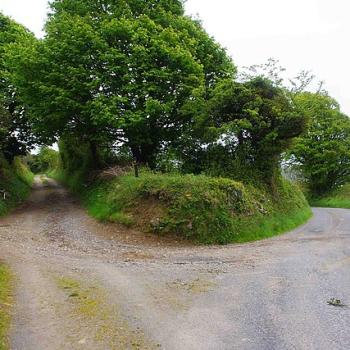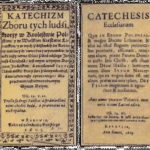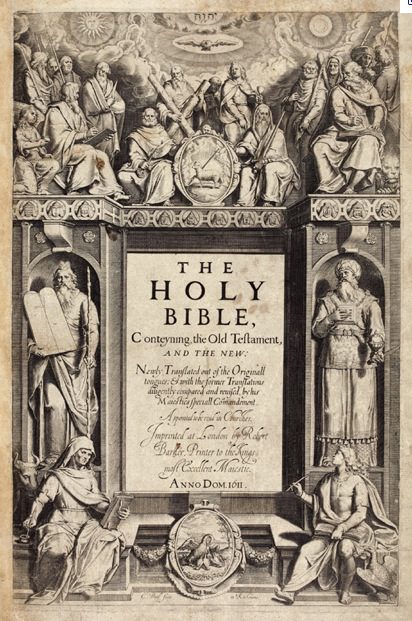
Title Page, 1611
The King James Bible
and the Power of a Dreaming God
A bit of history.
King James (the sixth of Scotland and first of England) not long crowned, planned a conference for November, 1603, to discuss sundry matters involving the relatively new church of which he was now head. While the ball started rolling when Henry VIII wanted a divorce, it really only took its broad shape under his younger daughter’s reign. James’ elder cousin.
However, due to an outbreak of plague the Hampton Court Conference in fact met in February, 1604. The king and his counselors dealt with some complaints from the Puritan element of the church, matters of who should officiate at baptisms (clergy only, thank you), and ecclesiastical discipline. In general he wanted to put his own imprint on the church Elizabeth largely created out of the ruin following Henry, Edward VI, and Mary.
This meeting also led to the king commissioning a new translation of the Bible.
A team consisting of forty-six clergy of the Church of England, and one lay communicant, Sir Henry Savile were selected and set to work. They were organized into six committees, and worked at both universities and Westminster Abbey. Richard Bancroft, then Archbishop of Canterbury served as “chief overseer” for the project.
The new bible was to look to previous translations, the Tyndale Bible, the Coverdale Bible, Matthew’s Bible, the Great Bible, and the Geneva Bible. Scholars have also felt some influences from the Taverner’s Bible and the New Testament part of the Douay–Rheims Bible.
The translators were also all scholars and highly competent in the languages of the Bible, and while mindful of the previous translations, as well as certain “guidelines” from the court, saw themselves as pursuing the best translation that was possible. And pretty much everyone since agrees that they achieved their goal of producing a scholarly and (generally) nonpartisan Bible.
Finally, today, the 2nd of May, 1611, “THE HOLY BIBLE, Conteyning the Old Teſtament, AND THE NEW: Newly Tranſlated out of the Originall tongues: & with the former Tranſlations diligently compared and reuiſed, by his Maiesties ſpeciall Comandement” was published by the King’s Printer.
Within a few years it would come to be called the King James Version of the Bible. And by those ignorant of its origins, as well as on occasion for those not in the habit of reading closely, the “St James Version.” It would remain “the” English language Bible well into the twentieth century. While not the primary version used in most churches nor in seminaries today, it remains much beloved. And parts, such as the psalms remain the preferred readings in times of distress for many people. For an interesting minority it is the only real version of the Bible., what God had intended.
Even beyond its theological and ecclesiastical importance the King James Version was quickly acknowledged as a major literary accomplishment of early modern English. Really counted only with Shakespeare. And, really, in front of him, as well. Its publication helped set the language we know today. It has been called the most influential version of the most influential book in what for a while yet has been the most influential language in the world.
So, even Richard Dawkins, best known as one of the more aggressive new atheists, once observed, “A native speaker of English who has never read a word of the King James Bible is verging on the barbarian.” He’s right. Me. I learned to read out of a large illustrated King James Bible resting on my grandmother’s lap. It gave me cadences and tropes, not to mention vocabulary that occupy my thinking and my writing to this day. More even than Shakespeare.
While my theology has shifted and turned over the many years, mostly rooted in core Mahayana Buddhist thinking, as well as a broadly skeptical and naturalistic sense of the way things are, my dreams are all populated from the readings and interpretations of that wondrous large book in my imagination forever sitting on my grandmother’s lap.
My dreams are populated by those figures out of the ancient near east captured in that book. Some are completely mythical, near as anyone can tell, like Abraham and Sarah and Moses and Miriam. And some have historical bones upon which myth has been layered like Jesus and the Marys. And. I know their stories. Their stories inform my own life and give it the color and shade of our common humanity. In some true ways they are as much a part of my thinking and who I am as my deepest analysis, as my core disposition.
We’re not just apes with good thumbs, although we are apes with thumbs, we also have mouths that speak and, my, the stories we can tell. Those stories are the stuff of our dreams.
And. Dreams matter. I repeat. Dreams matter.
I have long since noticed the actual dreams, the dreams generated in the night, certainly those I have, tend to be the engine racing, either reflective of the general anxiety of the human condition, or just noise reflecting the events of the previous day. Noticing it is a rare dream that conveys more information about my interior life, about my life beneath the waves of my sea of being, I’ve long since lost interest in tracking them.
That’s why when friends recount their dreams, all too often we find we must avert our eyes. It is all rather obvious. And, slightly embarrassing.
Recently, I was asked by an old friend what I thought of dreams. What I said is that ninety-eight percent of dreams reflect nervous energy attached to events, frequently from the previous day.
The other two percent are messages from the gods. Or, the God, the great dream God, the wondrous dreaming God.
Sometimes, in those dreams, that two percent of our dreams, there’s an invitation. For the dreamer. For the hearer. And in my life, they are often, maybe even mostly clothed in the stories and actions out of the book, the King James version of the book.
And then. Actually, at some point does it really matter if it is your dream or mine?
In that two percent, God and who you and I are, are present. We are a dreaming God.
Of course, the trick is to tell which is the ninety-eight percent, and which is God unveiled…


